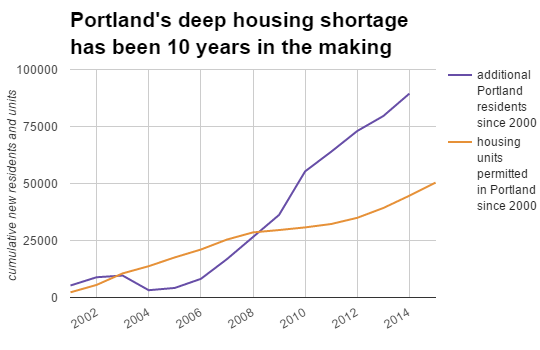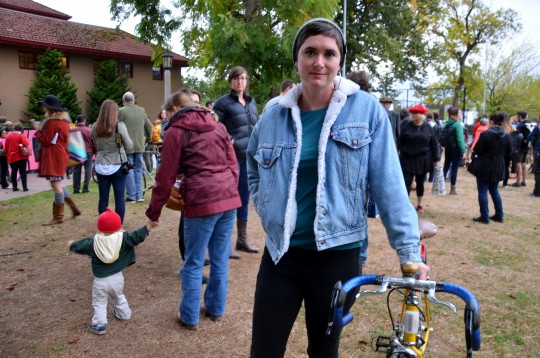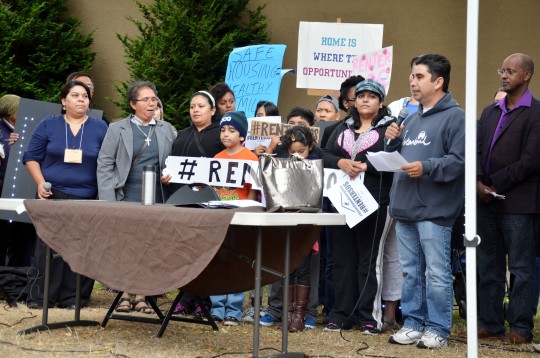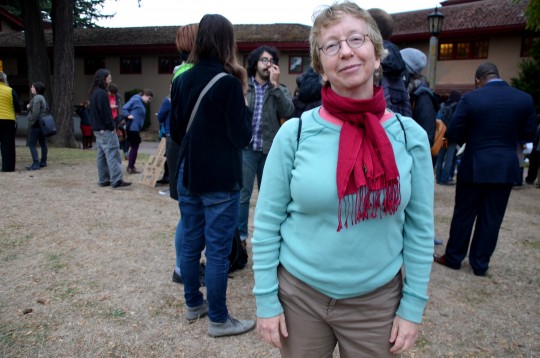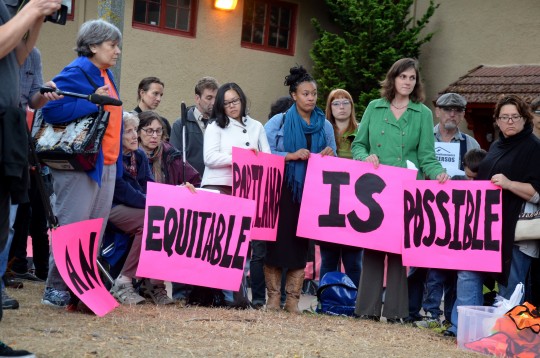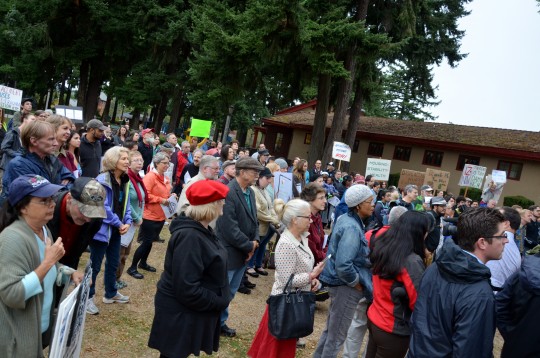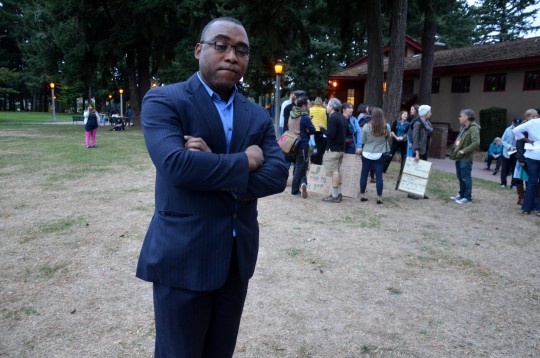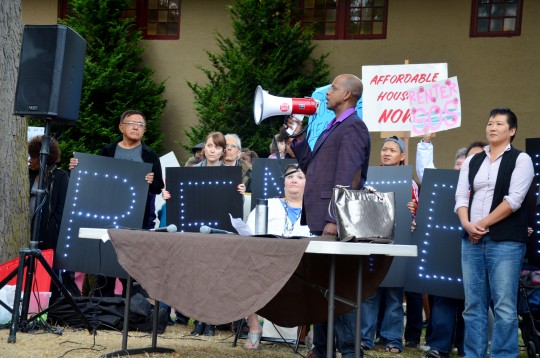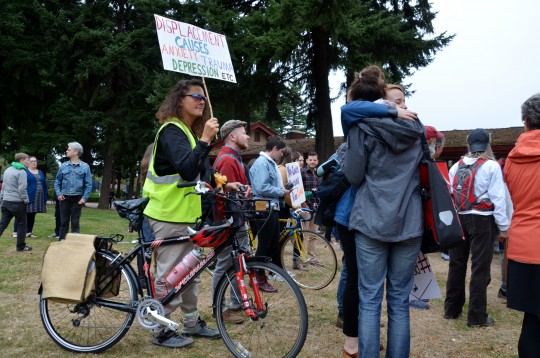
(Photos: M.Andersen/BikePortland)
Surrounded by about 200 worried tenants, by a contingent of local media and by zero elected officials, Portland’s most prominent renters’ advocacy group declared a “renters’ state of emergency” Tuesday.
Saying that they’ve seen a wave of no-cause evictions and huge rent hikes throughout the city, the Community Alliance of Tenants called for two actions that its staff admitted might not be allowed under current law: a one-year citywide moratorium on no-cause evictions and a requirement that landlords give one year’s notice to tenants of any rent hike larger than 5 percent.
“Right now it’s harder for a tenant to find housing here than it is for a landlord to push them out,” CAT Deputy Director Katrina Holland said. “This is beyond a crisis. This is an emergency. Our communities are hemorrhaging and the bleeding has to stop.”
Many attendees to the event, in North Portland’s Peninsula Park, arrived on the bikes and buses that they’re able to use for transportation because they live in the central city.
“I pretty much live in a state of fear when it comes to rental,” said Lise Ferguson, who works downtown as a barista and administrator for a nonprofit. “I pretty much move every year.”
Ferguson said she and roommates had to leave her last house because someone contacted their landlord and offered to buy the property. The landlord took the offer.
Her most recent move put her closer to the Vancouver-Williams corridor, she said, so it actually improved her bike commute. Ferguson said it’s possible for a low-wage worker to live within bikeable parts of Portland if and only if they’re OK with sharing a house with roommates.
“Which isn’t bad,” she added.
For families trying to find space for children with only one or two breadwinners, the situation is more dire. Speaking to the crowd Wednesday, Juan Gonzalez said his family of five was evicted this year after their apartment building was sold for $2.2 million. They’re now living in his sister-in-law’s living room.
“We were happy,” he said, before beginning to cry and handing off the microphone in the middle of his prepared speech. “They just take our lives away.”
Briana Winterborn said she’d been persuaded to buy a house nearby 10 years ago, before Portland’s current crisis took off. Today, she gets around largely on bike and transit thanks to living where she does.
“For that to be elitist feels wrong,” she said. “Housing and basic food shouldn’t be something people make money off of. … With food you can eat really simply — rice and beans. With housing, we’ve taken away all the options.”
Winterborn said she supports universal rent control, and also a limit on the amount of money someone can make by owning property.
Though some people in the crowd talked angrily about landlords, politicians and developers driving the crisis, the event’s organizers seemed to be striving to capture the perilous situation for tenants without casting blame.
“We have an opportunity to be innovative in how we handle this,” Holland said. “A growing city, community development and stability can coexist.”
The Rev. Mark Knutson, of Augustana Lutheran Church in Irvington, described Portland’s problem as essentially one of morality.
Advertisement
“We are in a crisis in this city and we all know it,” he said. “It is also a spiritual crisis. What we are seeing now in the city is immoral. … Greed is overcoming many neighborhoods.”
Promise King, executive director of the League of Minority Voters, said the city has failed to follow coordinated plans that would add transportation, housing and jobs to an area all at once in a way that could raise the incomes of struggling Portlanders rather than merely bringing in richer people to replace them.
“I don’t usually do kumbaya things like this,” he said. “I’m a policy wonk. [But] it affects so many issues of our community. We need a voice. … The landlord has so much power.”
CAT staff didn’t respond to requests late Tuesday for any documentation that this year’s situation is in fact worse than previous years, or if so by how much.
But there’s little doubt that the situation for Portland tenants has rarely been worse. The recession that began in 2009 led to a near halt in new housing units for three years, just as new residents were pouring into Portland faster than ever.
That’s led to a huge deficit in the number of local homes…
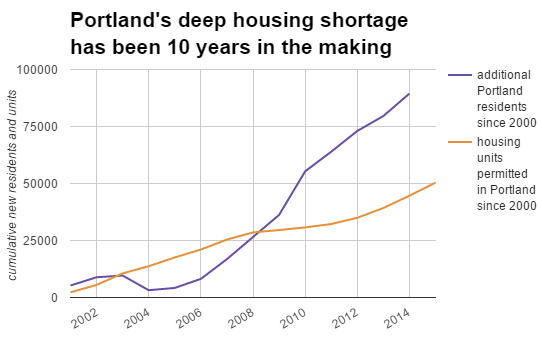
…and the Portland metro area has had one of the nation’s 10 worst rental vacancy shortages every year since 2007.
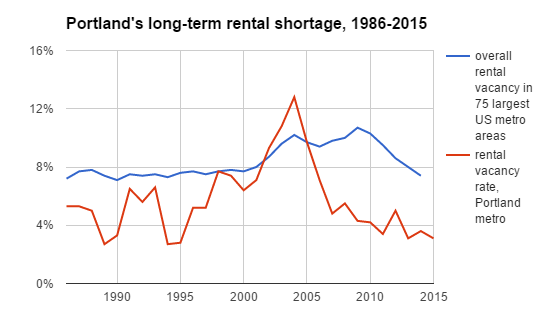
(Data: Census Bureau.)
Some lower-income people like Ferguson have responded by piling into old homes, essentially combining their buying power to compete with richer families. Families like the Gonzalezes have a harder time doing so; many have moved further in search of cheaper housing.
Is there a solution?
CAT Executive Director Justin Buri said “there’s a lot of research being done” about what the city and county can do. State law forbids cities from restricting rent changes or sales prices.
“Because the state has so thoroughly regulated landlord-tenant law, the city and county feel they have no room to implement these policies,” Buri said.
The city, meanwhile, bans denser development on most of its residential land. It’s illegal to build rowhouses or duplexes in most of central Portland; just 162 such units were built in the city last year.
Kayse Jama, executive director for the Center for Intercultural Organizing, asked anyone in the crowd who was an elected official to raise a hand.
No one did.
“We have broken promises from our elected officials,” Jama said into the bullhorn that rally speakers had begun using to address the crowd after their speaker system lost electricity. “Where are you? You should be here! You should be here!”
— The Real Estate Beat is a regular column. You can sign up to get an email of Real Estate Beat posts (and nothing else) here, or read past installments here.
